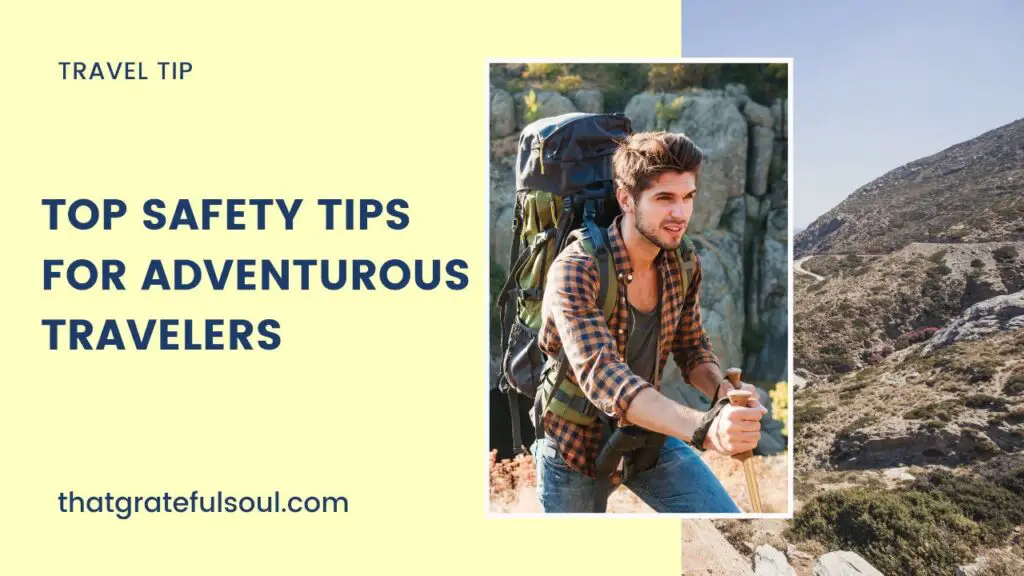Traveling to a new country is one of the most exciting and adventurous things that you can do. As an expat, you can experience a different culture and explore a new area of the world that you never have otherwise seen.
There are several things that you need to organize when you relocate and travel around a new country, whether you’re traveling around India, Australia, America, or elsewhere.
You need to find a new home, pack up your belongings, arrange an international courier, and apply for an appropriate visa.

-
Save
You must also consider your health and safety. Any form of travel in any area of the world carries a safety risk. While you can’t always prevent freak accidents, you can certainly take steps to keep yourself as safe as possible.
Top Health and Safety Tips for Traveling Expats
When you move abroad, the first thing you want to do is explore your new home. Becoming an ex-pat is a once-in-a-lifetime opportunity, and you will want to embrace it with open arms…and this means lots of traveling!
As much as you probably want to grab a backpack and head out of the door, you’ll need to think about your safety before you go anywhere.
Traveling carries health and safety risks at any destination, but it’s especially risky when you’re traveling around a country that is unfamiliar.
You don’t know the roads or the safe spots. You’ll be less familiar with the best public transport routes and the areas to avoid around your new hometown.
Taking the necessary precautions while you’re traveling around your new area means you can stay healthy and safe while enjoying everything that the country has to offer.
Here are some essential steps that you should take to maximize your safety during your exciting travels.
Get insured
Travel insurance is an absolute must-have for you as an expat. You might have purchased coverage for your initial move, but if you want to continue traveling around your new hometown, you will need additional coverage.
You can get nomad travel insurance that gives you the flexibility to explore with a financial safety net.
With travel insurance, you will be able to access emergency around-the-clock medical care.
You’ll also have access to emergency transportation if you get stranded and are unable to get back home.
If you’re particularly adventurous, you can add extra coverage to your travel insurance plan to cover hundreds of different adventure activities and sports.
With additional coverage, you can push the boundaries and try heart-racing activities, knowing that you can access immediate help if you need it.
Travel insurers provide regular updates to their policyholders regarding global safety and potential safety hazards in different cities and towns.
Staying up to date with the latest travel news means you can plan ahead and avoid putting yourself in the middle of dangerous situations.
Drink responsibly
This next tip will only apply if you’re an alcohol drinker, but since a large portion of the population enjoys a drink or two, we felt the need to include a section on alcohol safety!
While we encourage all of you to have a good time and let your hair down, we want to stress the importance of staying safe when drinking alcohol.
Being intoxicated puts you at an increased risk of accidents and injuries, and it’s much easier for somebody to take advantage of you when you’re drunk.
If you plan on drinking alcohol during your time traveling as an expat, make sure to pace yourself.
Drink water in between alcoholic beverages to avoid getting too drunk or passing out.
Always stay close to your friends or family when you’re drinking in bars or clubs, and make sure at least one person knows where you are at all times.
Be sure to keep a close eye on your drinks in public. Keep the top of your glasses or bottles covered with your hand, or use a drink cover so that nobody can slip something into them when you’re not looking.
Be careful with your money and cards
If you plan on living in the country for the foreseeable future, you’ll need to open up a bank account so that you can get paid and also spend your money.
When you open a new account, your bank will provide you with a debit or credit card that you can use to purchase day-to-day items and luxuries.
It’s common knowledge that you should avoid carrying large amounts of cash on your person when traveling, especially in a foreign!
Carrying cash makes you a more attractive target to opportunistic thieves and puts your safety at risk. Plus, cash can easily slip out of your pockets if you’re traveling and moving around all day.
Instead of carrying a bunch of cash in your pockets, use a debit or credit card wherever possible.
Not only will this make you less of a target for thieves and pickpockets, but it will also prevent you from accidentally dropping money.
Only use your debit card at trusted ATMs, and make sure to cover up your pin number every time you type it on the keypad.

